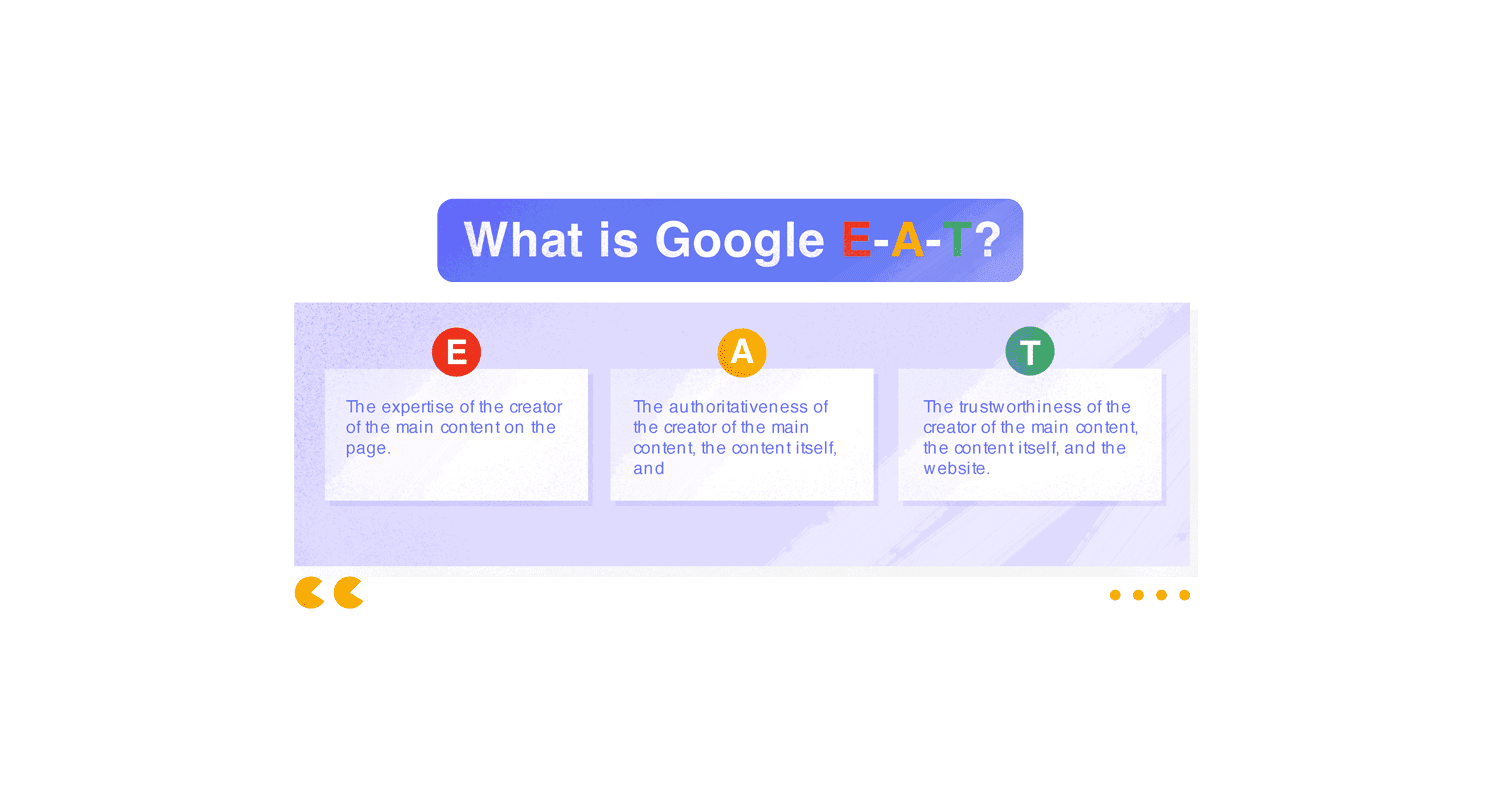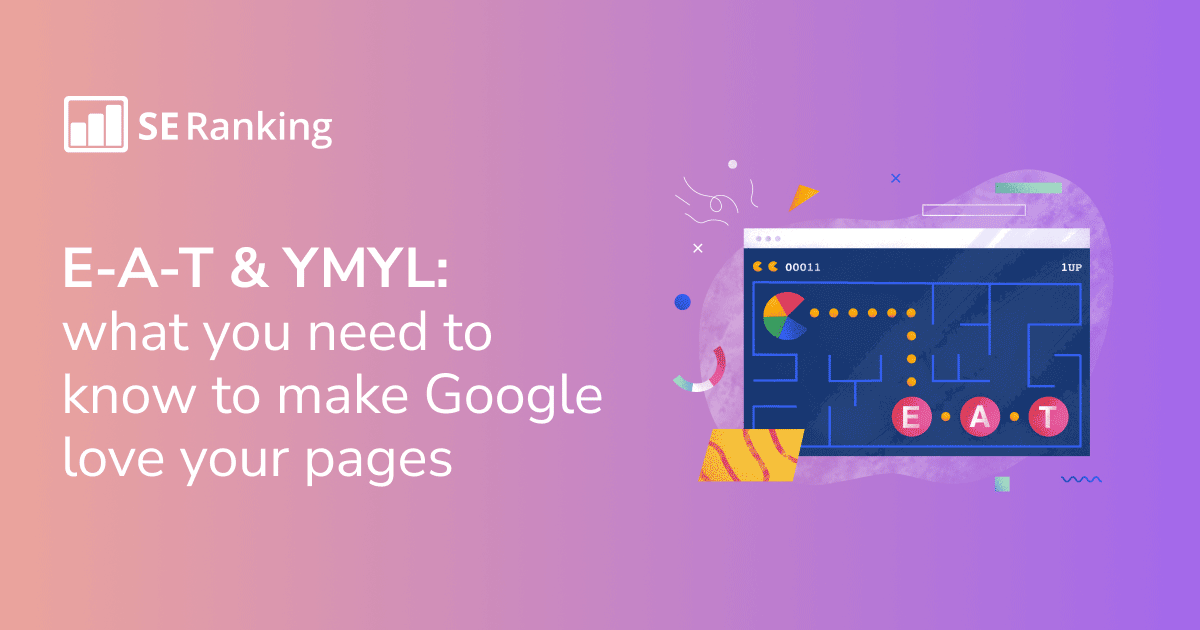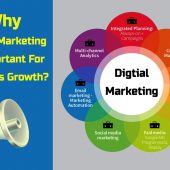Thank you for subscribing!
Google rewards sites that produce high-quality content because they tend to have the best answers to relevant queries. The two primary concepts that Google uses to assess content quality and value to readers are EAT and YMYL. In this article, we’ll take a look at both of these concepts and learn how they can affect rankings.
What is EAT
EAT is an acronym for Expertise, Authoritativeness, and Trustworthiness. It is a combination of specific signals that Google considers when evaluating page trust and quality. EAT is foundational to Google’s Quality Rating Guidelines.

Google considers a page to be high in quality if it fulfills these three parameters. If users like it just as much as Google does, the page will then compete with the highest ranking pages on the SERP for the same or similar search queries. This means that EAT parameters (along with other ranking factors) directly affect the page’s position on the SERP.
Let’s define each part.
Expertise
This indicator signals to Google that the content creator in question is a competent professional with proven experience—or isn’t. Google favors content written by subject matter experts—people with a deep understanding and experience in a given topic. Google’s raters will quite literally scour the internet for background information on authors and their publications, even when the publication is on a general topic, like a culinary blog post.
Authoritativeness
Google assesses the authoritativeness of the author, the main content of the page, and the website. It will check if the author’s expertise is recognized by other industry experts and if the website has a reliable reputation among them. The authoritativeness score is calculated by the number of backlinks from other resources and similar signals. This includes mentions in articles, reviews, references, or any other type of citation.
Trustworthiness
Google measures the integrity (more commonly known as trustworthiness) of the author, the page’s main content, and the website. Trustworthiness is determined by several trust factors. A great example of these factors is the credentials on the page: awards, testimonials, endorsements, etc.
EAT incentivizes authors to demonstrate their expertise, authoritativeness, and trustworthiness, especially when writing about legal, financial, or medical topics. For example, medical advice should be written or produced by people or organizations with appropriate medical expertise or accreditation.
This leads us to Google’s other important concept—YMYL. Let’s find out what it is.
What is YMYL
Some topics may affect users’ health, financial well-being, and safety. This could include medical or financial portals, or online stores. Google refers to these topics as Your Money or Your Life resources, or YMYL for short. Google will consider a site YMYL even if the site gives just one piece of advice on an important decision a user is about to make. Google double-checks YMYL sites to make sure they don’t contain inaccurate information and are not harmful to users.
All topics can be roughly divided into clear, potential, or unlikely YMYL topics, depending on how likely it is to cause harm. By default, most topics are considered not-YMYL and do not require special attention regarding accuracy or trust.
According to Google’s guidelines, a topic is considered YMYL if it can potentially affect:
- Health or safety: mental, physical, and emotional health; any form of safety
- Financial security: a person’s ability to provide for themselves and their families
- Society: perception of groups of people, issues of public interest, trust in public institutions
- Other: any topics where inaccurate info could harm people or worsen their well-being
Harmful pages may still appear in non-harmful topics. These pages should be red-flagged and rated as low quality and potentially harmful, even if the website as a whole has a positive reputation.
How EAT and YMYL are connected
Now, let’s match these two concepts. First, we previously mentioned that greater authority and trust scores can help with higher rankings on Google. But don’t take our word for it. Hear it from the tech giant itself.
We have very high Page Quality rating standards for YMYL pages because low-quality YMYL pages could potentially negatively impact a person’s happiness, health, financial stability, or safety.
Any website producing content related to finance is looked at closely by the search evaluator, so you absolutely MUST work on your EAT score if you own a YMYL topic resource. For example, let’s imagine that you’re working on a YMYL resource. It could be a website for an accountancy firm that publishes tax planning and investment advice. Users that end up on your website should be confident that the advice you provide won’t lead to wrong financial decisions and/or losing money.
Only people or organizations with appropriate financial expertise and accreditation should produce tax advice or materials on any other YMYL topics, but there are some exceptions. Authors don’t need credentials if they’re just telling a personal story or sharing their own experiences. Materials like “How I earned my first million” or “How we manage taxes in our company” are considered everyday expertise in YMYL topics and require less formal expertise.
A low EAT score might prevent your site from ranking high. Websites that don’t pay attention to readers’ well-being when creating content risk not appearing on Google for important keywords.
Even if your site isn’t considered YMYL, you should still try to work on the EAT score because a high EAT score signifies a high-quality website. Always keep the well-being of your users in mind and consider any potential effect your website may have on them. Only provide YMYL information that is carefully fact-checked by experts. If for any reason you need to talk about something that may be harmful, warn people about the topic’s potential risks and negative consequences.
The evolution of EAT and YMYL
EAT first appeared in 2014 when Google introduced its Search Quality Evaluator Guidelines. At that time, the whole concept was vague and it wasn’t clear how Google was going to use qualitative factors for calculating quantitative rankings. And while users looked for explanations, Google remained short on answers.
Google stated: The amount of expertise, authoritativeness, and trustworthiness is very important.
EAT and YMYL survived several major Google updates:
- In August 2018, Google rolled out a massive core algorithms update. Soon after that, many YMYL resources experienced a significant drop in rankings. There weren’t any details on the updates, but it was obvious that the update was primarily about Google’s ability to determine the EAT score and identify the most trustworthy websites.
- In June 2019, another major update affected the perception of EAT. Several websites with high authority scores experienced a serious drop in rankings shortly after the update happened. This proved that EAT isn’t assigned to the entire domain, but determined for each particular URL. In other words, EAT should be considered one of over 200 page quality parameters.
- In October 2020, Google made some important edits to the Search Quality Evaluator Guidelines. In particular, Google clarified that EAT ratings do not directly impact the order of search results. It also emphasized how important understanding the user intent and query is for ratings. Additionally, some minor changes were made to the guidelines—some explanations and examples were updated.
- In October 2021, Google introduced new changes to the Search Quality Evaluator Guidelines. It expanded several definitions in the YMYL category and updated guidance on how to do research on websites and on the reputation of content creators. Furthermore, Google updated and clarified Lowest Page Quality section.
- The last major update happened In July 2022. Google revised this document to align it with the newly published Search Quality Rater Guidelines: An Overview. It clarified the YMYL classification (Clear YMYL/May be YMYL/Not or unlikely YMYL), added new examples, and refreshed explanations on how to understand whether the topic on a given site or sites is considered YMYL (whether it requires a high level of accuracy to prevent significant harm). Additionally, the update introduced an explanation on Low and Lowest Page Quality sections, clarifying that the level of E-A-T depends on the purpose of the page, so any type of website can be considered low quality or harmful.
Even today, EAT and YMYL remain a hot topic of debate. Although Search Quality Evaluator Guidelines is a valuable source of information on EAT, it is only a working document for evaluators—not an actual guidebook.
Make sure to use this information with caution.
Is EAT a ranking factor
Despite the tremendous impact that EAT has on the page quality score and rankings, most SEO experts agree that EAT is not a full-fledged ranking factor. At least not yet.

Danny Sullivan
Public Liaison for Search at Google
Is E-A-T a ranking factor? Not if you mean there’s some technical thing like with speed that we can measure directly. We do use a variety of signals as a proxy to tell if content seems to match E-A-T as humans would assess it. In that regard, yeah, it’s a ranking factor.
The main problem with EAT is that it is a qualitative parameter, not a quantitive one. This means that to be considered a ranking factor, EAT should be calculated algorithmically. There is also currently no singular EAT score assignable to a website. Instead, EAT serves as a specific signal to other Google ranking algorithms on how to behave with a website.

Ben Gomes
SVP of Education at Google
You can view the rater guidelines as where we want the search algorithm to go. They don’t tell you how the algorithm is ranking results, but they fundamentally show what the algorithm should do.
Nevertheless, Google has already started working towards turning EAT into a numeric ranking factor. There have been several ideas on how to make it possible. Let’s start with the easiest and probably most obvious ones. Google pays people to assess websites. Those raters assess the utility and quality of content according to expertise, authoritativeness, and trustworthiness. In theory, they assign an overall score that can be included in ranking algorithms.

Danny Sullivan
Public Liaison for Search at Google
Our systems aren’t looking for EAT. Our raters are using that to see if our systems are working well to show good information. There are many different signals that, if we get it right, align with what a good human EAT assessment would be.
Another idea is to calculate the number and context of mentions or links to the page or author. Basically, links are great signals of the content’s trustworthiness. For YMYL topics, the reputation of a website or content creator should be judged by the number of mentions from experts in the industry. Recommendations from expert sources, such as professional online communities, are strong evidence of a very positive reputation.
But there are also some more sophisticated solutions. Google has a patent for technology that can calculate the credibility of an author of online content. According to the description, the reputation score can include two or more sub-scores, where each sub-score relates to a different quality of the online content item. The reputation score can be further based on the number of links the online content item has from other online content. It can be further based on how long an author has been an authenticated author.
EAT, as you can see, is a concept and not a ranking factor. But Google clearly sees EAT and YMYL as important parts of Google’s future algorithms. EAT may one day become a ranking factor.
How to optimize EAT on YMYL pages
Producing high-quality content can be a lofty task on its own. Making sure your website is trustworthy to visitors adds a whole new layer of complexity, especially for webmasters who own YMYL resources. There are a few fairly simple yet effective ways to optimize web pages for better EAT.
- Create unique and quality content. Unique and high-quality content written for people (not just for search engines) makes a big difference. To convince Google that you’re an expert, you have to understand your target audience’s interests and provide valuable information in a comfortable way. Keep your content up-to-date by periodically revising and adjusting existing texts.
- Maintain the author’s visibility. Readers won’t trust your YMYL content if you don’t reveal the author’s basic credentials—at the very least. Readers will want to know who created the article and with whom they can talk to if they have questions. That’s why it is a must to keep the author visible, especially on YMYL sites. Keep in mind, that according to Google guidelines, every page on a website should have information about who is responsible for the website and who created the content on the page (individual, company, business, foundation, etc.).
- For individual authors and content creators, create separate pages with biographical information, links to their social media accounts or personal websites, CVs, or professional certificates as proof of reputation. Author Schema is a great way to disambiguate information about the author on the web page. Not only is it easy to use, but it also speeds up the time it takes for search engines to find information about the author. Also, don’t forget to link up pages using materials from the same author.
- Get mentions on authoritative sites. A smart link-building strategy can significantly improve your website’s reputation not only from a technical standpoint (think of the PageRank algorithm, for example) but also in the eyes of your readers. This means that a link from a highly acclaimed authoritative website will pass some of its authority and brand recognition to another website. In the context of EAT, it’s a good idea to get backlinks to your author’s pages as well. Find websites that have a special bio section and arrange it so that you can get backlinks to your author’s page.
- Add trust factors across the site. Trust factors are a set of specific features or elements that help improve the trustworthiness of your site relative to both users and search engines. To get top-ranking positions, incorporate as many trust factors on your site as possible. For example, create and update an About Us page by describing your achievements, adding certificates and diplomas, or even displaying a portfolio and reviews from real customers.
Final thoughts
Expertise, Authoritativeness, and Trustworthiness of content are important for page quality. Even though they aren’t direct quantitative factors, they have a qualitative impact on a page’s ability to rank. EAT parameters are especially important for resources that affect people’s health, well-being, and safety—the so-called YMYL resources.
Set a purpose to increase the chances that your content will rank well. Try to figure out how to create content that provides the most benefit to your users, then start working on authority and building the trust score of your content. Google’s algorithms are constantly changing, so you should also keep a close eye on any updates and align your content with Google’s new requirements.
Stay tuned with SE Ranking updates, and feel free to share your own experience with EAT in the comments below.






